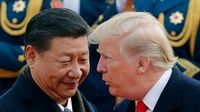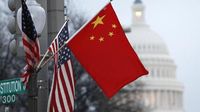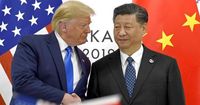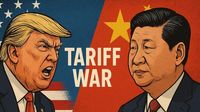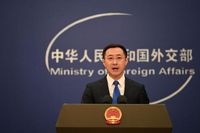In a significant escalation of the ongoing trade war between the United States and China, the Trump administration announced on April 15, 2025, that it has imposed a staggering 245% tariff on Chinese imports. This move comes in response to China's retaliatory actions following President Trump's recent trade policies, which have already caused considerable tension in global markets.
The announcement, outlined in a fact sheet released by the White House, stated that the new tariffs were a direct consequence of China's retaliatory measures against U.S. exports. Earlier, President Trump had imposed a 10% tariff on all countries that impose high taxes on the United States, which was briefly paused as over 75 nations sought to negotiate new trade agreements with the U.S. However, China, which had retaliated with its own tariffs, was specifically excluded from this pause.
White House Press Secretary Karoline Leavitt emphasized the administration's stance, stating, "The ball is in China’s court. China needs to make a deal with us; we don’t have to make a deal with them." She further elaborated that China is in need of the American consumer and, by extension, the financial resources that come from the U.S. market.
The newly implemented tariffs affect a wide range of products, with some categories facing exorbitant rates. For instance, syringes and needles are now subject to a 245% tariff, while lithium-ion batteries face a 173% tariff. Other notable items include squid (170%), wool sweaters (169%), and electric vehicles (148%). This comprehensive tariff structure aims to counteract what the U.S. government perceives as unfair trade practices by China.
China's Foreign Ministry spokesperson, Lin Jian, responded to the tariffs, asserting that the trade war was initiated by the United States and calling for a cessation of threats and blackmail. Lin stated, "If the U.S. truly wants to resolve the issue through dialogue and negotiation, it should stop using maximum pressure and stop threats and blackmail." His remarks reflect the ongoing tension and the complexities of international negotiations.
In a related development, the Chinese government has taken steps to bolster its trade negotiation team by appointing Li Chenggang as the new international trade negotiation representative and vice commerce minister. This move signals China's intention to engage more effectively in trade discussions amidst the escalating tensions.
As the trade war continues, the implications for both economies are profound. The tariffs are expected to increase costs for American importers and consumers, particularly in sectors heavily reliant on Chinese goods. For instance, the electronics market, which includes smartphones and laptops, is likely to be significantly impacted, as a substantial portion of these products is sourced from China.
In 2024, the United States imported approximately $52 billion worth of smartphones, with over 80% originating from China. Although recent customs guidance had exempted laptops and smartphones from previous tariffs, the new import taxes mean that these devices will still face additional costs.
Moreover, the impact of these tariffs extends beyond consumer electronics. Industries such as automotive manufacturing, textiles, and various consumer goods will also feel the strain. Nearly 30% of textile imports into the U.S. come from China, and over 50% of imports in categories like furniture and toys are sourced from Chinese manufacturers.
Despite the escalating conflict, President Trump has expressed a willingness to negotiate a trade deal with China, but has insisted that Beijing must initiate the discussions. "China wants what we have... the American consumer, or to put another way, they need our money," Leavitt reiterated during a press briefing.
The current situation has led to a volatile environment in the global stock markets, with investors reacting to the uncertainty surrounding U.S.-China relations. The White House's decision to impose such high tariffs is viewed as part of Trump's broader "America First" trade policy, aimed at protecting American industries and reducing reliance on foreign goods.
As the trade war intensifies, both nations are grappling with the potential long-term economic consequences. The U.S. has launched a national security investigation into the import of strategic resources, citing concerns over dependence on foreign sources for materials crucial to advanced manufacturing and defense.
China's economy, however, has shown resilience, posting unexpectedly strong growth of 5.4% in the first quarter of 2025, despite the looming tariffs. This growth has outpaced the expectations of economists and reflects China's ability to adapt to the pressures of the trade war.
In conclusion, the recent escalation in tariffs marks a pivotal moment in U.S.-China relations, with both sides entrenched in their positions. As the two largest economies in the world navigate this complex landscape, the outcome of their negotiations will have far-reaching implications for global trade and economic stability.
